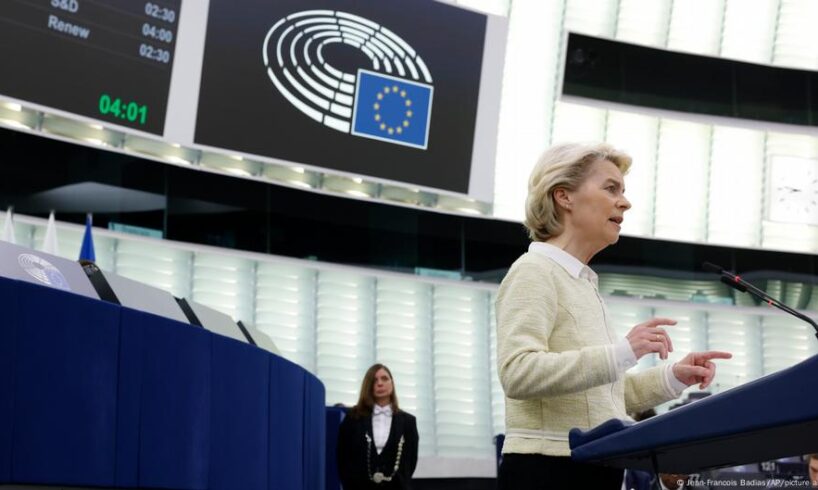
The European Union has adopted a new set of sanctions against Russia in the hopes of restricting its ability to wage war in Ukraine.
The EU Commission President Ursula von der Leyen said the bloc was “striking at the heart of Russia’s war machine,” and will keep up the pressure on Russia until a ceasefire is agreed.
The EU sanctioned Russia’s energy, banking and military sectors in a slew of measures that France’s top diplomat hailed as “unprecedented.”
EU plans new sanctions to deflate Putin’s war chest
To view this video please enable JavaScript, and consider upgrading to a web browser that supports HTML5 video
What are the sanctions?
The EU has set a dynamic price cap on Russian oil — at 15% below the average market value — from $60 [€51.49] to $47.6 [€40.85].
The bloc has banned all future transactions via both Nord Stream pipelines and introduced an import ban on refined petroleum products made from Russian crude oil and processed in a third country.
It has banned 22 more Russian banks and more than a hundred non-EU shipping vessels that comprise a part of Russia’s so-called shadow fleet, tankers that operate outside of standard international maritime regulations.
More than two dozen entities have been subjected to tighter export restrictions over supplying Russia with dual-use technologies that serve civilian but also military purposes. At least seven of these are Chinese, three are from Hong Kong and four based in Turkey.
Experts believe the EU sanctions have killed the prospects of reviving the Nord Stream pipelinesImage: The Swedish Coast Guard/abaca/picture alliance
What could these sanctions achieve?
The sanctions have effectively “killed” the Nord Stream pipelines, said Ben McWilliams, an affiliate fellow in the field of energy and climate policy with the Brussels-based Bruegel think tank.
Nord Stream pipelines run from Russia to Germany via the Baltic Sea.
McWilliams said that a series of underwater explosions had damaged the pipelines back in September 2022 and yet there were discussions around the possibility of reviving them in Germany.
These sanctions make that much harder, he added.
“This is a very important clause. Anybody could have imported [oil] from Nord Stream, there was nothing to stop them,” he told DW. “But now there is a ban, which means in any future scenario, whatever the politics of the day looks like, a decision to lift the ban would have to be taken at the Union level,” with all member states in agreement.
“The ban on imports of petroleum products from third countries if refined from Russian oil was also quite significant,” he added.
In alignment with this measure, the EU has sanctioned one of India’s main refineries of Russian oil.
“For the first time, we’re designating a flag registry and the biggest Rosneft refinery in India,” the EU’s top diplomat Kaja Kallas posted.
Ukraine’s government has welcomed the sanctionsImage: Robert Ghement/dpa/picture alliance
Experts: Enforcement challenges remain
Jakob Kirkegaard, Senior Fellow at the Peterson Institute For International Economics [PIIE], said he suspected Russia was selling more than half of its oil exports via the shadow fleet.
As Russia faces a lower price cap for its oil, he said, it may now be encouraged to sell more via the shadow fleet which allows it to escape the price cap and is harder to chase on the high seas.
“Unless Baltic sea countries say we won’t accept any such ship crossing through our waters, and just confiscate them,” Kirkegaard said, enforcement of sanctions remains weak.
But seizing ships has its own issues and could be seen as a “violation of freedom of navigation in international waters and could set a precedent,” that could be misused by other countries.
“Then of course there is the fear that Russia might retaliate militarily.”
Moreover, experts argued that banning one Indian oil refinery exporting refined petroleum products was insufficient.
“The way India has been buying Russian fuel at cheaper prices I would assume many Indian refineries are refining Russian oil and exporting it to the EU,” added Kirkegaard.
They said once these refined petroleum products, such as diesel, arrive from India to Europe, it was impossible to trace their origin.
In the wake of ongoing talks on an EU-India free Trade Agreement [FTA], Kirkegaard added, the EU would have taken New Delhi into confidence before imposing the sanction.
“I don’t think it is going to be such a big deal, frankly. It will probably annoy the Indians. But will it lead to some big crisis between India and the EU? I would be skeptical.”
India’s economy reaps benefits from Russian oil imports
To view this video please enable JavaScript, and consider upgrading to a web browser that supports HTML5 video
Can the US impose and enforce sanctions?
All eyes in the EU are now on Washington.
They are hoping President Trump delivers on his threat of imposing a 100% tariff on any country that is trading with Russia if there is no peace deal in 50 days, Trump’s new timeline.
“The EU paved the way. Now it’s time for perfect storm — the US Senate to vote on that Russia sanctions bill imposing crushing burdens on Russian economy and those fueling Russia’s war of aggression,” Lithuanian Foreign Minister Kęstutis Budrys posted on X.
No one believes thatEuropean sanctionsare enough to change Russian President Putin’s war calculus and end Russian aggression in Ukraine.
But they can limit Russia’s ability to inflict war on others over time. “What these sanctions essentially amount to, is weakening Russia economically over the longer run,” he added. “Russia is the main military threat to the EU, and that’s what the EU needs, a weaker Russia.”





